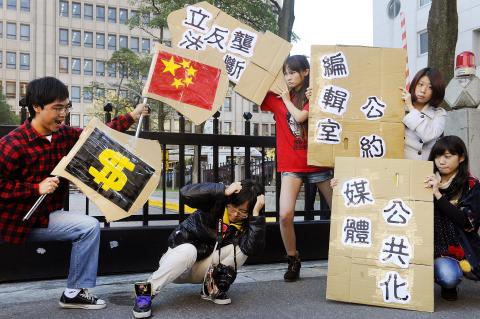The Fair Trade Commission yesterday said it had not received a buyout application for the Next Media Group (壹傳媒集團), nearly one month after the Hong Kong-based company confirmed plans to sell its Taiwanese operations for NT$17.5 billion (US$601.3 million).
Spokesman Sun Lih-chyun (孫立群) said the commission has the authority to intervene if the buyers of the group’s print and TV businesses in Taiwan were to proceed with the buyout without submitting an application and gaining approval from the commission.
While the commission cannot take any action now, “there is a four-month deadline for the buyout, so time is on our side,” Sun said at a press conference.

Photo: George Tsorng, Taipei Times
CHANGES?
Sun’s remark came two days after the Hong Kong company disclosed in a stock exchange filing that it would sell its Taiwanese print assets — Chinese-language Apple Daily (Taiwan) (台灣蘋果日報), Sharp Daily (台灣爽報) and Next Magazine (壹週刊) — for NT$16 billion and Next TV Broadcasting Ltd (壹電視) for NT$1.5 billion.
The filing said the completion of the deal would be conditional on the fulfillment of the buyout of Next Media’s print media subsidiaries, and if the sale agreement of Next Media’s print group is not fulfilled within four months, the prospective buyers have the right to cancel the deal.
According to the filing submitted to the Hong Kong Stock Exchange late on Wednesday, Formosa Plastics Group (FPG, 台塑集團) chairman William Wong (王文淵) will acquire 34 percent of Next Media’s print assets, followed by Want Want Times Group (旺旺中時集團) president Tsai Shao-chung (蔡紹中) with 32 percent, Chinatrust Charity Foundation (中信慈善基金會) chairman Jeffrey Koo Jr (辜仲諒) with 20 percent and Lung Yen Life Service Corp (龍巖集團) chairman David Lee (李世聰) with 14 percent.
The filing said that buyers of Next TV are Wong with a 34 percent share, Koo with 20 percent and Lee with 14 percent, while Taiwan Fire & Marine Insurance Co (台灣產物保險) chairman Steve Lee’s (李泰宏) son, Lee Jiang-cheng (李建成), will hold 32 percent.
TRANSPARENCY
In response to criticism that the commission has not been fully transparent with its review process, Sun said the commission could not disclose the information provided by the companies involved, adding that it would also not be suitable to make it clear to Next Media’s buyers how they could circumvent the government’s regulatory review.
Asked whether the commission would call a public hearing with the all prospective investors in the Next Media deal participating, Sun said it was an option that the commission would consider.
However, the commission would have to notify participants 30 days before the hearing, but it only has 60 days to review the case, Sun said. Moreover, a public hearing on the case would be nothing more than a means for the commission to gather opinions, he added.
As for whether Apple Daily and Next Magazine should be considered as two products targeting the same market, Sun said the preliminary conclusion is that they target two different markets.

Taiwan Semiconductor Manufacturing Co (TSMC, 台積電) last week recorded an increase in the number of shareholders to the highest in almost eight months, despite its share price falling 3.38 percent from the previous week, Taiwan Stock Exchange data released on Saturday showed. As of Friday, TSMC had 1.88 million shareholders, the most since the week of April 25 and an increase of 31,870 from the previous week, the data showed. The number of shareholders jumped despite a drop of NT$50 (US$1.59), or 3.38 percent, in TSMC’s share price from a week earlier to NT$1,430, as investors took profits from their earlier gains

In a high-security Shenzhen laboratory, Chinese scientists have built what Washington has spent years trying to prevent: a prototype of a machine capable of producing the cutting-edge semiconductor chips that power artificial intelligence (AI), smartphones and weapons central to Western military dominance, Reuters has learned. Completed early this year and undergoing testing, the prototype fills nearly an entire factory floor. It was built by a team of former engineers from Dutch semiconductor giant ASML who reverse-engineered the company’s extreme ultraviolet lithography (EUV) machines, according to two people with knowledge of the project. EUV machines sit at the heart of a technological Cold

AI TALENT: No financial details were released about the deal, in which top Groq executives, including its CEO, would join Nvidia to help advance the technology Nvidia Corp has agreed to a licensing deal with artificial intelligence (AI) start-up Groq, furthering its investments in companies connected to the AI boom and gaining the right to add a new type of technology to its products. The world’s largest publicly traded company has paid for the right to use Groq’s technology and is to integrate its chip design into future products. Some of the start-up’s executives are leaving to join Nvidia to help with that effort, the companies said. Groq would continue as an independent company with a new chief executive, it said on Wednesday in a post on its Web

CHINA RIVAL: The chips are positioned to compete with Nvidia’s Hopper and Blackwell products and would enable clusters connecting more than 100,000 chips Moore Threads Technology Co (摩爾線程) introduced a new generation of chips aimed at reducing artificial intelligence (AI) developers’ dependence on Nvidia Corp’s hardware, just weeks after pulling off one of the most successful Chinese initial public offerings (IPOs) in years. “These products will significantly enhance world-class computing speed and capabilities that all developers aspire to,” Moore Threads CEO Zhang Jianzhong (張建中), a former Nvidia executive, said on Saturday at a company event in Beijing. “We hope they can meet the needs of more developers in China so that you no longer need to wait for advanced foreign products.” Chinese chipmakers are in